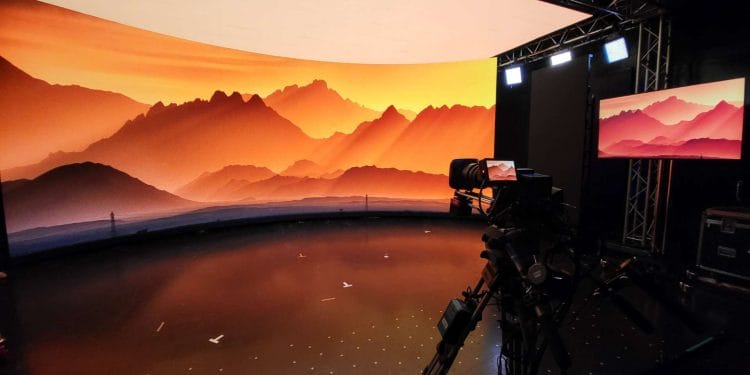The London Academy of Music and Dramatic Art (LAMDA) will become one of the first drama schools in the UK to offer students virtual production technology training in a new state-of-the-art studio after receiving almost £2million in funding from the Department of Education.
Founded in 1861, LAMDA is the oldest drama school in the United Kingdom and was awarded £1,934,746 funded by a capital grant from the Office for Students – England’s independent regulator for higher education.
With the help of the funds, the school, which has Hollywood actor Benedict Cumberbatch sitting as its President, has been able to invest in virtual production (VP) and motion capture (Mocap) technology in ultra-modern studios, where there is ‘industry-wide skills gap’. LAMDA hopes to open the studios and offer courses to students by the end of the year.
VP merges the technique of physical and virtual filmmaking on a 9 x 3.5 metre or full training size virtual production LED wall background where production teams can create versions of scenes using computer generated imagery (CGI) footage before actors have even arrived on set.
Some of the most innovative and biggest television and film studios are using VP including in Disney+ The Mandalorian (2019) and movies such as The Suicide Squad starring Margot Robbie and The Batman (2022) with Robert Pattinson.
Acclaimed award-winning film director Joe Russo, who made You, Me and Dupree and the Avengers movies, said: “It’s exhilarating to see LAMDA stepping into the VP space. I don’t know any other drama school that is thinking about virtual production in the way that LAMDA is. This is a hugely creative endeavor and shows real forward-thinking ambition. By making unaffordable technology accessible, they will open up the playing field to new storytellers. It’s an exciting time to be part of LAMDA.”
The use of VP accelerated when the Covid-19 pandemic hit as it provided new opportunities for production teams to innovate as well as save time and money in post-production. The technology also enabled teams to shoot on location without flying cast and crew across the world.
Principal and Chief Executive of LAMDA, Professor Mark O’Thomas said: “This is a substantial investment into LAMDA’s screen skills component and future-proofs the learning environment for changing industry needs. It ensures our students emerge from training being ‘set ready’ in a range of technologies, and technicians enter the work arena with the right skills, knowledge, and experience to meet future demand.
“We plan to use the funds for film, TV and storytelling and provide education all round from preparing actors to act in a VP setting as well as the technical aspects for VP management. VP and Mocap are becoming more and more widely used by TV and film studios which is also advancing at such a pace that skilled employees are difficult to recruit.
“The capital grants allow LAMDA to provide students with niche, relevant and up-to-date skills that even most industry professionals would not have. It exposes students to the latest screen technology uses while addressing the growing skills gap in screens and film industry. We can also upskill professionals who are already in the industry.
“The investment continues to position LAMDA as a global leader in the performing arts education sector by capitalizing on its classical acting training and melding it with the newest cutting-edge screen technology.”
To deal with the skills gap in VP and Mocap, LAMDA is set to introduce a new FdA (Foundation Degree in Education) course in Creative Virtual Production Management, an MA (Master of Arts) course in Production Management for Screen, Audio & Virtual Production and academic credit-earning evening courses, in specialised digital skills which could eventually lead to a degree. LAMDA will also run a number of CPD (continuous professional development) courses in these emerging technologies.
LAMDA also plans to use part of the funding to update their audio suite, and to replace halogen lights with environmentally-friendly LEDs as part of its overall shift to include sustainability as a fundamental principle of its production and technical art course.

















